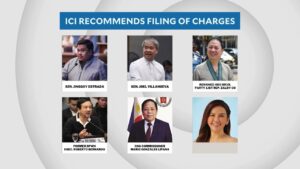MANILA, Philippines – In a significant and sweeping action against alleged systemic corruption, the Independent Commission for Infrastructure (ICI) formally recommended to the Office of the Ombudsman on Wednesday that criminal and administrative cases be filed against two incumbent senators, a resigned party-list representative, and several other former government officials. The charges stem from their purported involvement in a multi-billion-peso “kickback scheme” centered on suspicious and potentially “ghost” flood-control projects across the country.
The filing marks a crucial escalation in the government’s efforts to hold high-ranking officials accountable for the pervasive anomalies plaguing public works contracts, particularly those related to vital infrastructure designed to protect communities from flooding.

The Roster of the Accused and Corroborating Evidence
ICI Chair Andres Reyes led the filing at the Ombudsman’s office, confirming the names of the individuals targeted in this latest batch of charges. The gravity of the investigation is highlighted by the prominence of those implicated.
The Commission specifically recommended the filing of charges against the following six individuals:
Senator Jinggoy Estrada: Current member of the Senate.
Senator Joel Villanueva: Current member of the Senate.
Elizaldy “Zaldy” Co: Resigned Ako Bicol party-list Representative.
Roberto Bernardo: Former Undersecretary of the Department of Public Works and Highways (DPWH).
Mario Lipana: Incumbent Commissioner of the Commission on Audit (COA).
Mitch Cajayon-Uy: Former Caloocan Second District Representative.
Reyes stressed that the inclusion of these officials in the ICI’s referral was not arbitrary. It was based on comprehensive supporting documentation, most critically, the sworn affidavits and corroborating evidence provided by former high-ranking insiders from the very agency responsible for the projects.
These key whistleblowers were identified as former Department of Public Works and Highways (DPWH)–Bulacan District Engineer Henry Alcantara, and former DPWH-Bulacan Assistant District Engineers Brice Ericson Hernandez and Jaypee Mendoza. Their detailed testimonies provided the blueprint of the alleged conspiracy, lending significant institutional weight to the ICI’s findings. The ICI’s successful acquisition of corroborated evidence from multiple DPWH engineers suggests a systematic failure of internal controls and a deep-seated culture of corruption within the infrastructure sector.
Anatomy of a Systematic Kickback Scheme
The core of the ICI’s interim report details a sophisticated and systematic method for diverting public funds, a mechanism described by Reyes as a “kickback scheme.”
Reading from a prepared statement, Andres Reyes outlined how the alleged corruption was executed:
“The Commission uncovered an alleged systematic ‘kickback scheme’ in which legislators, acting as project proponents, inserted flood-control projects into the National Expenditure Program (NEP), House General Appropriations Bill (HGAB), and the General Appropriations Act (GAA) in exchange for commissions ranging from 20% to 30% of project costs.”
This process reveals how political influence was allegedly leveraged at the earliest stage of the budget cycle. By strategically inserting projects—often referred to as “pork barrel” or “discretionary funds” in various iterations—into the national budget, the implicated legislators ensured the projects were funded, even if they were unnecessary or destined to be “ghost projects” (projects that exist only on paper) or were intentionally designed to be substandard.
Reyes further elucidated the logistics of the illicit payments: “Payments were reportedly coursed through DPWH engineers and cooperating contractors to secure project awards and facilitate releases.” This description points to a carefully structured network where DPWH officials acted as conduits, ensuring the public funds were routed back to the initiating legislators and their associates once project milestones were ostensibly met.
The consequences of this arrangement, according to the former DPWH officials’ affidavits, were dire for the public treasury and for public safety. The “kickback scheme” allegedly led to inflated project costs, grossly substandard implementation of necessary works, and the systematic diversion of billions of pesos in public funds over a sustained period of several years. When infrastructure fails to meet safety standards—especially flood control projects—the direct result is increased vulnerability for citizens during natural calamities.

The Legal Weight: Plunder and Anti-Graft Charges
The ICI chair affirmed that the alleged participation of the six incumbent and former government officials constitutes clear violations of the nation’s most stringent anti-corruption laws.
The recommended charges include:
-
Plunder (Republic Act No. 7080, Section 2): This is the most severe charge, reserved for officials who illegally amass, accumulate, or acquire ill-gotten wealth amounting to at least 50 million pesos. Given the ICI’s mention of “billions of pesos” in diverted funds, the application of the Plunder Law is appropriate and signifies the magnitude of the crime alleged.
Anti-Graft and Corrupt Practices Act (Republic Act No. 3019, Sections 3(b) and 3(c)): These sections pertain to accepting unwarranted benefits (3b) and causing undue injury to the government (3c) through manifest partiality, evident bad faith, or gross inexcusable negligence.
Bribery and Corruption of Public Officers (Revised Penal Code, Articles 210-212): These statutes cover the act of receiving gifts or promises in consideration of a specific action, or inaction, related to one’s public office.
Reyes emphasized the legal foundation for the referral: “Their alleged participation appears to constitute violations of Articles 210-212 of the Revised Penal Code on bribery and corruption of public officers, Sections 3(b) and 3(c) of Republic Act No. 3019 (Anti-Graft and Corrupt Practices Act), and Section 2 of Republic Act No. 7080 (Plunder Law), given the magnitude of funds involved.”
ICI’s Mandate and the Road Ahead
The ICI’s role, as emphasized by Andres, is to investigate and refer, not to convict. He offered a crucial caveat, maintaining the constitutional principle of presumption of innocence: “The ICI emphasized that the Interim Report does not make categorical findings of guilt and that the determination of liability rests with the proper authorities.”
The goal of the report, he added, is precisely to spur action: “This Interim Report is intended to assist in ensuring accountability in infrastructure projects and in protecting the integrity of public funds.”
The filing, which took place at 1 p.m. at the Office of the Ombudsman, is not the first legal action taken by the Commission in its active probe into flood control anomalies. This is the second round of recommendations filed before the Ombudsman.
The first referral, submitted on September 29, urged the Ombudsman to determine appropriate charges against 18 public officials, including former Representative Co (who is thus implicated in both waves of charges). That initial recommendation specifically focused on alleged irregularities concerning a single P289.5-million flood control project in Naujan, Oriental Mindoro.
The latest filing, which implicates two sitting Senators and expands the scope to a nationwide systemic scheme, signals that the ICI’s investigation is intensifying and broadening its focus from individual project irregularities to a concerted effort to dismantle an entrenched network of corruption at the highest levels of government. The onus now falls on the Ombudsman to review the exhaustive evidence, find probable cause, and file the formal charges before the Sandiganbayan, the country’s dedicated anti-graft court.





